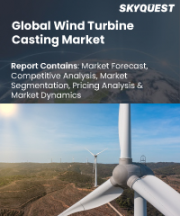
|
시장보고서
상품코드
1616198
육상 풍력 터빈 피치 및 요 드라이브 시장 기회, 성장 촉진요인, 산업 동향 분석 및 예측(2024-2032년)Onshore Wind Turbine Pitch and Yaw Drive Market Opportunity, Growth Drivers, Industry Trend Analysis, and Forecast 2024 to 2032 |
||||||
육상 풍력 터빈 피치 및 요 드라이브 세계 시장은 2023년 48억 달러로 평가되었고, 2024-2032년간 연평균 5.9% 성장할 것으로 예상됩니다.
풍력 터빈에서 피치 드라이브 시스템은 블레이드의 각도를 조정하여 에너지 획득을 최적화하고, 극한의 풍하중으로부터 보호하며, 유지보수 및 비상 시 제동 및 셧다운 절차를 관리하기 위해 매우 중요합니다. 한편, 요 드라이브 시스템은 로터가 바람의 방향에 적절히 정렬되어 있는지 확인하여 효율을 극대화합니다. 피치 및 요 시스템에 IoT, 센서 및 AI를 통합하여 실시간 피드백 및 예측 유지보수 기능을 강화하여 시장 성장을 더욱 촉진하고 있습니다. 터빈 제조업체들은 서로 다른 터빈 모델 간에 이러한 시스템을 표준화하여 비용을 절감하고 유지보수를 용이하게 하는 경향을 보이고 있습니다.
육상 풍력 발전 프로젝트가 확대됨에 따라 규모의 경제로 인해 피치 및 요 구동 시스템이 더 저렴해지고 있으며, 특히 소규모 사업자에게 유리하게 작용하고 있습니다. 피치 시스템의 경우, 2032년까지 전동화 부문은 16억 달러 이상 시장 규모에 이를 것으로 예상됩니다. 이러한 성장의 배경에는 터빈 기계의 발전, 효율성 개선의 필요성, 신뢰성에 대한 강조가 있습니다. 전기 피치 시스템은 효율성이 높고, 유지보수가 필요 없으며, 제어가 용이해 기존 유압 시스템보다 선호되는 선택이 되고 있습니다. 이러한 시스템은 전력 소비가 적기 때문에 전체 터빈의 효율성이 향상되어 여러 개의 터빈으로 상당한 에너지 절약이 가능한 대규모 육상 풍력 발전소에서는 특히 유리합니다.
대형 블레이드 시장은 2032년까지 연평균 복합 성장률(CAGR) 5%로 성장할 것으로 예상됩니다. 긴 블레이드는 더 많은 바람을 포착하고 특히 낮은 풍속에서 더 높은 에너지 출력을 생성 할 수 있기 때문에 점점 더 인기를 얻고 있습니다. 경량 복합재료와 탄소섬유의 사용을 포함한 기술 발전으로 인해 무게를 크게 늘리지 않고도 더 큰 블레이드를 생산할 수 있게 되었습니다. 이러한 추세는 풍속이 낮은 지역에서 특히 유리하며, 블레이드의 대형화는 터빈의 효율을 향상시킵니다. 아시아태평양의 육상 풍력 터빈용 피치 요오드 드라이브 산업은 2032년까지 37억 달러 규모에 달할 것으로 예상됩니다. 중국, 인도, 호주를 포함한 이 지역 국가들은 탄소 배출량 감축을 위한 지원책에 힘입어 육상 풍력 프로젝트 채택을 가속화하고 있습니다. 터빈의 대형화, 고출력화 추세도 이 지역의 효율 향상과 시스템 보급에 기여하고 있습니다.
| 시장 범위 | |
|---|---|
| 시작 연도 | 2023년 |
| 예측 연도 | 2024-2032년 |
| 시작 가격 | 48억 달러 |
| 예상 가격 | 85억 달러 |
| CAGR | 5.9% |
목차
제1장 조사 방법과 조사 범위
제2장 주요 요약
제3장 산업 인사이트
- 산업 에코시스템
- 규제 상황
- 산업에 대한 영향요인
- 성장 촉진요인
- 산업의 잠재적 리스크와 과제
- 성장 가능성 분석
- 가격 동향 분석
- Porter's Five Forces 분석
- PESTEL 분석
제4장 경쟁 구도
- 서론
- 전략 대시보드
- 혁신과 기술 전망
제5장 시장 규모와 예측 : 유형별, 2021-2032년
- 주요 동향
- 1,000W 이하
- 1,000W-3,000W
- 3,000W 이상
제6장 시장 규모와 예측 : 피치 시스템별, 2021-2032년
- 주요 동향
- 전기식
- 기계식
- 유압식
제7장 시장 규모와 예측 : 블레이드 장별, 2021-2032년
- 주요 동향
- 소형
- 중형
- 대형
제8장 시장 규모와 예측 : 지역별, 2021-2032년
- 주요 동향
- 북미
- 미국
- 캐나다
- 멕시코
- 유럽
- 독일
- 스페인
- 영국
- 프랑스
- 이탈리아
- 스웨덴
- 폴란드
- 덴마크
- 포르투갈
- 네덜란드
- 아일랜드
- 벨기에
- 아시아태평양
- 중국
- 인도
- 호주
- 일본
- 한국
- 베트남
- 태국
- 필리핀
- 대만
- 중동 및 아프리카
- 남아프리카공화국
- 이집트
- 라틴아메리카
- 브라질
- 칠레
- 아르헨티나
제9장 기업 개요
- ABM Greiffenberger
- Bosch Rexroth AG
- Bonfiglioli S.p.A
- Dana SAC UK
- Comer Industries
- KEBA
- Liebherr
- Nabtesco Corporation
- Nanjing High Speed Gear Manufacturing Co., Ltd
- Nidec Conversion
- SIPCO-MLS
- Schaeffler Group
- ZOLLERN GmbH & Co.
The Global Onshore Wind Turbine Pitch and Yaw Drive Market was valued at USD 4.8 billion in 2023 and is expected to grow at 5.9% CAGR between 2024 and 2032. In wind turbines, the pitch drive system is crucial for adjusting blade angles to optimize energy capture, protect against extreme wind loads, and manage braking and shutdown procedures during maintenance or emergencies. Meanwhile, the yaw drive system ensures the rotor is properly aligned with the wind direction to maximize efficiency. The integration of IoT, sensors, and AI into pitch and yaw systems has enhanced their real-time feedback and predictive maintenance capabilities, further driving market growth. Turbine manufacturers are increasingly standardizing these systems across different turbine models, leading to cost reductions and easier maintenance.
As onshore wind projects expand, economies of scale are making pitch and yaw drive systems more affordable, particularly benefiting smaller operators. In terms of pitch systems, the electric segment is expected to exceed USD 1.6 billion by 2032. This growth is backed by advancements in turbine machinery, the need for improved efficiency, and a focus on reliability. Electric pitch systems are becoming the preferred choice over traditional hydraulic systems due to their greater efficiency, lower maintenance needs, and superior control. These systems consume less power, boosting overall turbine efficiency, which is specifically favorable in vast onshore wind farms where energy savings are substantial across multiple turbines.
The market for large blade lengths is projected to grow at a 5% CAGR through 2032. Longer blades are increasingly popular due to their ability to capture more wind and generate higher energy output, particularly at lower wind speeds. Technological advancements, including the use of lightweight composite materials and carbon fiber, have allowed the making of large blades without considerably increasing their weight. This trend is particularly advantageous in regions with lower wind speeds, where larger blades enhance turbine efficiency. APAC onshore wind turbine pitch and yaw drive industry is forecast to reach USD 3.7 billion by 2032. This growth is fueled by regulatory incentives, ambitious renewable energy targets, and advancements in wind technology.Countries in the region, including China, India, and Australia, are accelerating the adoption of onshore wind projects, driven by supportive policies aimed at reducing carbon emissions. The trend toward larger turbines with higher power output also contributes to increased efficiency and widespread adoption of these systems in the region.
| Market Scope | |
|---|---|
| Start Year | 2023 |
| Forecast Year | 2024-2032 |
| Start Value | $4.8 Billion |
| Forecast Value | $8.5 Billion |
| CAGR | 5.9% |
Table of Contents
Chapter 1 Methodology & Scope
- 1.1 Research design
- 1.2 Base estimates & calculations
- 1.3 Forecast model
- 1.4 Primary research & validation
- 1.4.1 Primary sources
- 1.4.2 Data mining sources
- 1.5 Market definitions
Chapter 2 Executive Summary
- 2.1 Industry 360° synopsis, 2021 - 2032
Chapter 3 Industry Insights
- 3.1 Industry ecosystem
- 3.2 Regulatory landscape
- 3.3 Industry impact forces
- 3.3.1 Growth drivers
- 3.3.2 Industry pitfalls & challenges
- 3.4 Growth potential analysis
- 3.5 Price trend analysis
- 3.6 Porter's analysis
- 3.6.1 Bargaining power of suppliers
- 3.6.2 Bargaining power of buyers
- 3.6.3 Threat of new entrants
- 3.6.4 Threat of substitutes
- 3.7 PESTEL analysis
Chapter 4 Competitive landscape, 2024
- 4.1 Introduction
- 4.2 Strategic dashboard
- 4.3 Innovation & technology landscape
Chapter 5 Market Size and Forecast, By Type, 2021 - 2032 (USD Million & MW)
- 5.1 Key trends
- 5.2 < 1000 W
- 5.3 1000 W - 3000 W
- 5.4 >3000 W
Chapter 6 Market Size and Forecast, By Pitch System, 2021 - 2032 (USD Million & MW)
- 6.1 Key trends
- 6.2 Electric
- 6.3 Mechanical
- 6.4 Hydraulic
Chapter 7 Market Size and Forecast, By Blade Length, 2021 - 2032 (USD Million & MW)
- 7.1 Key trends
- 7.2 Small
- 7.3 Medium
- 7.4 Large
Chapter 8 Market Size and Forecast, By Region, 2021 - 2032 (USD Million & MW)
- 8.1 Key trends
- 8.2 North America
- 8.2.1 U.S.
- 8.2.2 Canada
- 8.2.3 Mexico
- 8.3 Europe
- 8.3.1 Germany
- 8.3.2 Spain
- 8.3.3 UK
- 8.3.4 France
- 8.3.5 Italy
- 8.3.6 Sweden
- 8.3.7 Poland
- 8.3.8 Denmark
- 8.3.9 Portugal
- 8.3.10 Netherlands
- 8.3.11 Ireland
- 8.3.12 Belgium
- 8.4 Asia Pacific
- 8.4.1 China
- 8.4.2 India
- 8.4.3 Australia
- 8.4.4 Japan
- 8.4.5 South Korea
- 8.4.6 Vietnam
- 8.4.7 Thailand
- 8.4.8 Philippines
- 8.4.9 Taiwan
- 8.5 Middle East & Africa
- 8.5.1 South Africa
- 8.5.2 Egypt
- 8.6 Latin America
- 8.6.1 Brazil
- 8.6.2 Chile
- 8.6.3 Argentina
Chapter 9 Company Profiles
- 9.1 ABM Greiffenberger
- 9.2 Bosch Rexroth AG
- 9.3 Bonfiglioli S.p.A
- 9.4 Dana SAC UK
- 9.5 Comer Industries
- 9.6 KEBA
- 9.7 Liebherr
- 9.8 Nabtesco Corporation
- 9.9 Nanjing High Speed Gear Manufacturing Co., Ltd
- 9.10 Nidec Conversion
- 9.11 SIPCO-MLS
- 9.12 Schaeffler Group
- 9.13 ZOLLERN GmbH & Co.



















